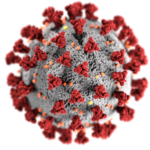Colorado Governor Jared Polis and Colorado state health officials announced that a man in Colorado has been confirmed to have the COVID-19 variant first discovered in the United Kingdom. This is the first confirmed case with the variant in the U.S.
The man is in his 20s and has no history of traveling. He lives in Elbert County, around 55 miles southeast of Denver. Elbert County is rural, with a population of less than 30,000.
According to Gov. Polis and the Colorado health officials, scientists in the United Kingdom believe the variant, known as ther B.1.1.7 variant , makes the SARS-CoV-2 virus more contagious but not more severe.
The pharmaceutical companies Pfizer and BioNTech received the first Emergency Use Authorization for a COVID-19 vaccine. They held a press conference to say they are confident their vaccine works against the variant, and they’re continuing to test their vaccine.
Moderna, which also received an EUA for its vaccine, released a statement: “We continue to test the Moderna COVID-19 Vaccine against new SARS-CoV-2 variants, and our expectation is that the vaccine’s effectiveness will hold against them as well.”
Colorado health officials say the man has had no close contacts identified yet, and they are continuing to try to identify any other potential cases or contacts.
According to the CDC, the variant was first discovered in Southeast London, in November. The CDC says that the virus SARS-CoV-2 mutates regularly, acquiring about one new mutation in its genome every two weeks. According to the CDC, the potential consequences of the mutations could be:
- Ability to spread more quickly in humans. There is already evidence that one mutation, D614G, has this property to spread more quickly. In the lab, G614 variants propagate more quickly in human respiratory epithelial cells, out-competing D614 viruses. There also is evidence that the G614 variant spreads more quickly than viruses without the mutation.
- Ability to cause either milder or more severe disease in humans. There is no evidence that VOC 202012/01 produces more severe illness than other SARS-CoV-2 variants.
- Ability to evade detection by specific diagnostic tests. Most commercial polymerase chain reaction (PCR) tests have multiple targets to detect the virus, such that even if a mutation impacts one of the targets, the other PCR targets will still work.
- Decreased susceptibility to therapeutic agents such as monoclonal antibodies.
- Ability to evade vaccine-induced immunity. FDA-authorized vaccines are “polyclonal,” producing antibodies that target several parts of the spike protein. The virus would likely need to accumulate multiple mutations in the spike protein to evade immunity induced by vaccines or by natural infection.
The CDC says that “among these possibilities, the last—the ability to evade vaccine-induced immunity—would likely be the most concerning because once a large proportion of the population is vaccinated, there will be immune pressure that could favor and accelerate emergence of such variants by selecting for “escape mutants.” There is no evidence that this is occurring, and most experts believe escape mutants are unlikely to emerge because of the nature of the virus.”
For the CDC document about variants, click here.
